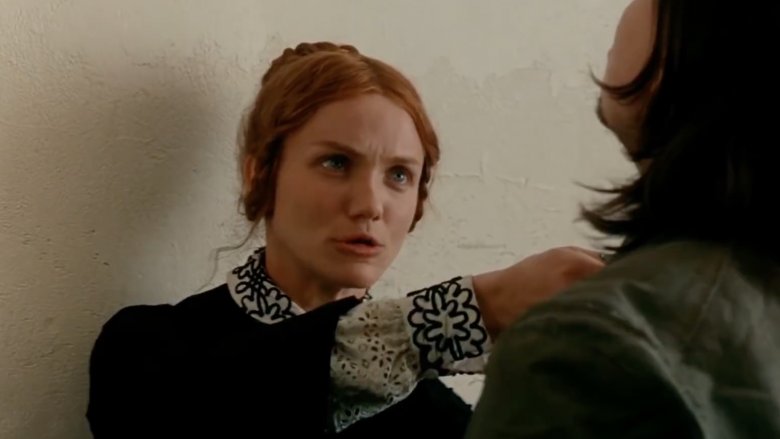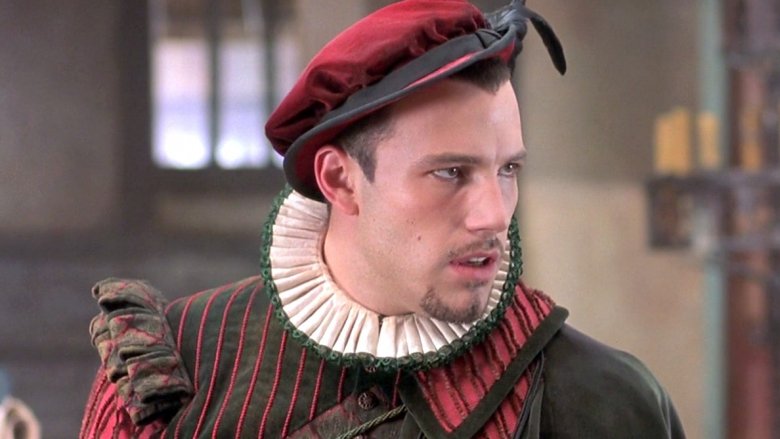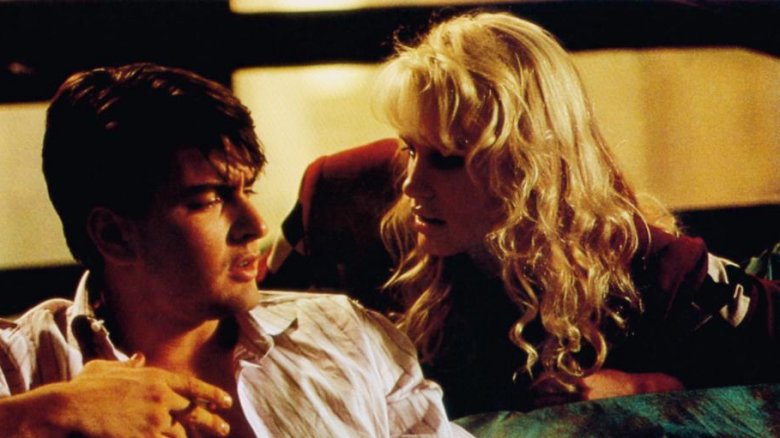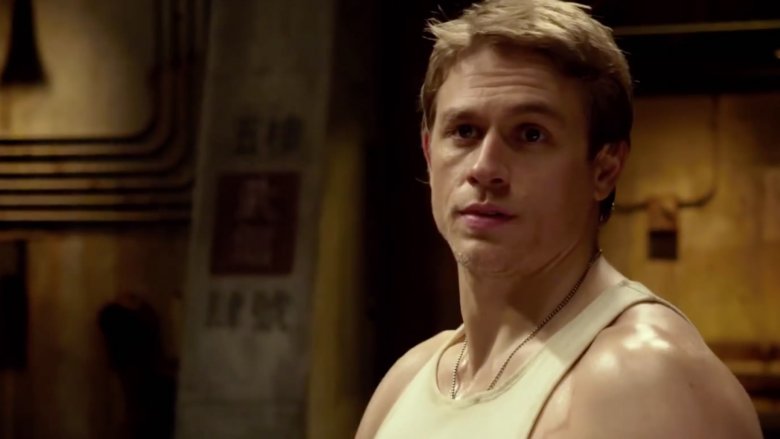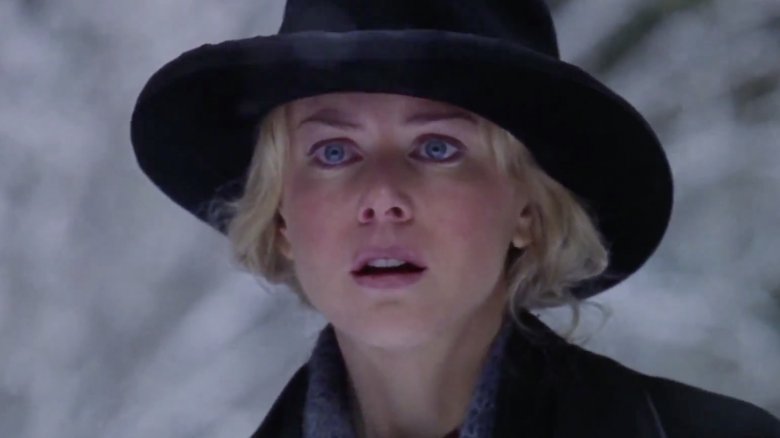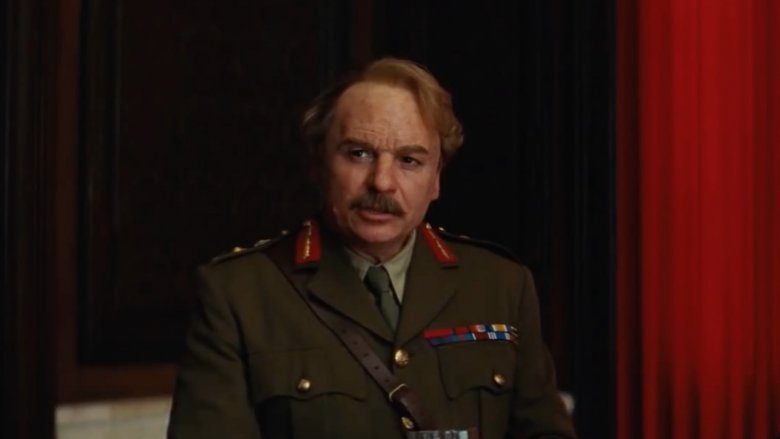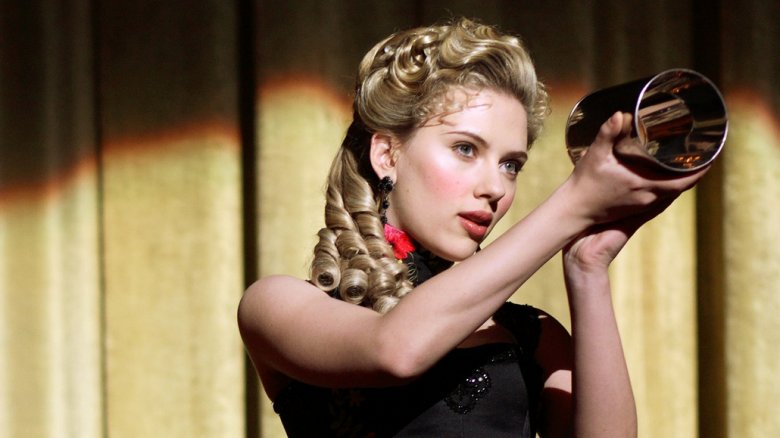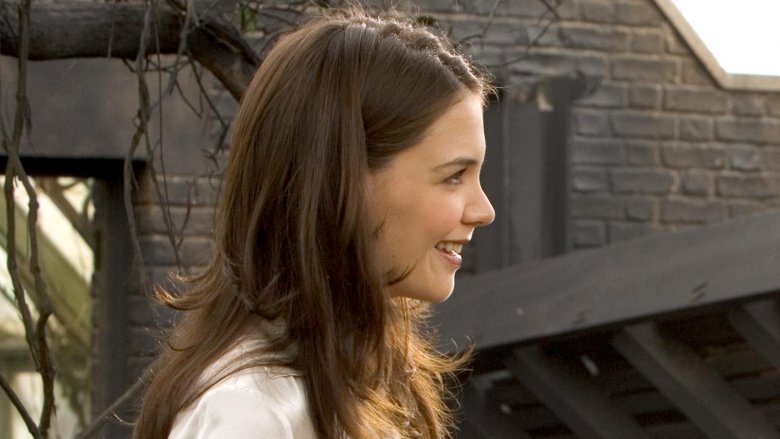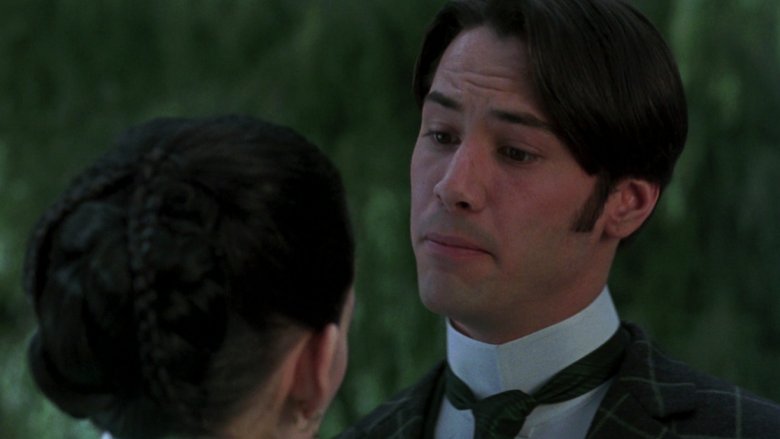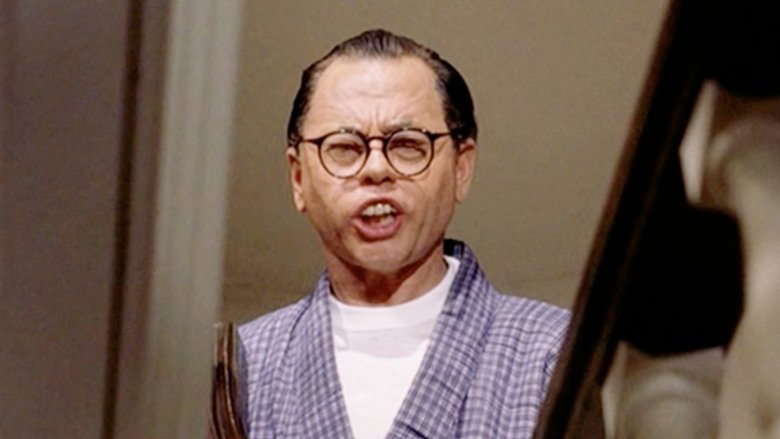Great Movies Almost Ruined By One Bad Performance
Every team has its weak link, and while a person generally doesn't achieve Hollywood star status without possessing at least a modicum of talent, every movie's cast definitely has its stragglers. Every film fan is familiar with the sinking realization that they've put themselves in front of a movie that holds up in just about every respect...except for one cast member's distractingly bad performance. You know that moment — the one when you're watching a great movie, and you're taken out of it every time a particular actor shows up onscreen and throws the whole thing out of whack with work that's clearly disconnected from everything else that's happening in the film. It can be painful to watch. The test of a great movie, however, is whether or not it can withstand that one less-than-memorable actor — and, somehow, these movies managed to do just that. Here's a look at great movies that were almost ruined by one bad performance.
Gangs of New York - Cameron Diaz
Look, it's easy to lay the blame for a bad performance squarely at the feet of the actor who delivered it. In reality, a lot of bad performances are merely the result of poor casting, and there are not many worse cast roles in the history of cinema than Cameron Diaz in Martin Scorsese's 19th century turf-war drama Gangs Of New York.
To be fair, Diaz had been on a bit of a roll heading into Gangs having scored accolades for her performances in heady fare like Being John Malkovich and Vanilla Sky. Those films were very contemporary in both style and setting though. Gangs of New York was a very different animal. One that also required the actor to dye her hair red and don a Scottish accent. Or maybe that was an Irish accent? To be honest, it's impossible to tell for most of her screen time. And more often than not, that accent just sort of disappears altogether.
Diaz's performance was more than just a bad accent. There was also a fundamental disconnect between the actor and the character she was playing—an embittered, tough-as-nails thief who's known nothing but hard times. Diaz never quite finds the character's essence, and her performance frequently undermines the overall effect of the rest of the film. Thank goodness Daniel Day-Lewis was around to keep things interesting.
Shakespeare In Love - Ben Affleck
People talk a lot of smack about Shakespeare In Love these days. Back before it somehow bested Saving Private Ryan to win the Academy Award for Best Picture 1999, most of those folks would also have tagged it as a clever, unabashedly romantic take on the life of history's most beloved playwright. They would have told you it's an excellent movie. They probably would've told you how strong the central performances in the film are too, though they definitely would have mentioned how weird it was when Ben Affleck turned up as legendary old-English actor Ned Alleyn.
Affleck's appearance in the film was one of 1998's genuine head-scratching moments for cinema lovers. One that was only topped by his use of a flaky British accent. We're still not sure how director John Madden allowed Affleck to go on with that accent, but Affleck makes matters worse by trying to bury his accent problems under a smarmy layer of machismo. It doesn't work, and it leaves you utterly disliking a character that should be a lot of fun, even sympathetic.
It also leads one to ask the larger question of how Affleck ended up in Shakespeare In Love to begin with. Though the answer is quite sweet, the film is almost unwatchable when he's on screen. His presence becomes one of those glaring distractions that most films cannot overcome. That Shakespeare In Love works in spite of it should be all the proof naysayers need of the film's valor.
Wall Street - Daryl Hannah
Daryl Hannah has been one of the more hit or miss actors of recent decades. When she's good—Roxanne, Kill Bill—not many actors are as charming or as intimidating. When she's not—Crazy People, Wall Street—she's downright grating. Though it's almost unfair to single out Daryl Hannah for Wall Street, mostly because she's tasked with playing the film's least developed character. Factor in that she's sharing the screen with a never-better Charlie Sheen, an absolutely iconic Michael Douglas and, well, let's just say that Hannah wasn't exactly set up for success.
Still, great actors always rise to the occasion, especially when actors around them are working at such a high level. While Hannah's role in Oliver Stone's corporate drama is hardly the stuff of Shakespeare, there was certainly enough going on with her social-climbing interior decorator for the actor to bring a little depth to the part. Hannah never really finds her footing in the role. Rather than coming off as strong-willed and calculating, Hannah's hammy, melodramatic turn dooms the character to the level of icy and dimwitted. With Douglas and Sheen bringing their A-games to the film, Hannah appears out classed and out of place—and while her costars were winning Oscars and other accolades, Hannah took home the 1988 Razzie for Worst Supporting Actress.
Pacific Rim - Charlie Hunnam
Pacific Rim is one of those films that probably seemed like a "sure thing" to the blockbuster set in Hollywood. The concept—essentially it's Transformers vs. Godzilla only smarter—is like a tentpole fever dream, and it even had visionary director Guillermo del Toro propping it up. Turns out there really are no "sure things" in Hollywood, and the team behind Pacific Rim quickly found that casting can be a make or break figure in the blockbuster equation.
Del Toro and Co. simply didn't do the math when they decided not to cast a bona fide movie star to carry Pacific Rim. Instead, they brought in TV star Charlie Hunnam, hoping that the largely untested actor would rise to the occasion and be the charismatic, thoughtful, romantic tough guy needed to hold the film together.
Hunnam didn't rise. His performance is flat and lifeless. He had zero chemistry with co-star Rinko Kikuchi—which also undercut an essential plot point—and Pacific Rim nearly crumbled under the weight of Hunnam's blandness. The good news is that it doesn't quite crumble. Pacific Rim is big and bold and clever in ways that most blockbusters never even dream. That the film is still so much fun to watch, and that it still made a lot of money internationally, is purely a testament to the strength of del Toro's vision. We can only wonder how much better Pacific Rim might have been had Hunnam matched its energy.
Cold Mountain - Nicole Kidman
Nicole Kidman has given so many fantastic performances over the years, so the times that she didn't generally stick out like a sore thumb. Cold Mountain is undeniably the sorest of Nicole Kidman's appendages.
Though on paper at least, the Civil War-set drama had potential to be one of her greatest triumphs. Produced by indie powerhouse Miramax, and costarring the likes of Jude Law, Renee Zellweger, Philip Seymour Hoffman, Natalie Portman and Donald Sutherland, and directed by the late great Anthony Minghella, Cold Mountain should have been an awards season player for everyone involved. It wasn't.
While the film did decent box-office, it seemed to fall just short of its artistic potential. Nicole Kidman's performance was a big part of the problem. What happened you ask? Remember when we told you that Cold Mountain was set during the Civil War? It was also set in the deep south. Nicole Kidman's character actually hails from Savannah, Georgia, which means Kidman had to do a southern accent in the film. Let's just say that the accent didn't quite work out, and that it led to Kidman delivering a weak, melodramatic performance that harkens back to old Hollywood—see Gone With The Wind—in all the worst ways.
Inglorious Basterds - Mike Myers
Quentin Tarantino's Inglorious Basterds will be remembered for a lot of reasons. Not only did the film giddily rewrite history by giving Adolf Hitler and his Third Reich cronies the brutal ends they earned, it also made a star of relative unknown Michael Fassbender and made an Oscar Winner of Christoph Waltz.
While Tarantino has always had a knack for casting exactly the right person in exactly the right part—and resurrecting a career or two in the process—his casting of Mike Myers as a high-ranking British officer on Inglorious Basterds was one of those WTF moments that we still can't quite get over.
Not that Myers wasn't worth the risk. He's proven time and time again that he's capable of doing great things with the right part, and Tarantino has consistently proven that he can make almost any risk pay off, but both of them missed the mark on Inglorious Basterds. Myers seems to be trying so hard to not do Austin Powers that he ends up just doing a toned down version of Austin Powers. His appearance in the film—even behind all that make up—feels more like a stunt than a risk. One that proves distracting to the point of taking you out of the film altogether, and we should never want to leave a film where Hitler and the Reich finally get what's coming to them.
The Prestige - Scarlett Johansson
Christopher Nolan may well be the best director working in Hollywood today, and many of his biggest fans would argue that his 2006 film The Prestige is his best work. There's a fair argument to be made there. The Prestige is a canny mix of high-concept/high-entertainment fare that Nolan has come to be known for, but we'd be a little more inclined to call it his best if we could go back in time and recast the role of Olivia Wenscombe.
If you're wondering who played that role, it was the generally reliable Scarlett Johansson. If you're also wondering why she was cast as a turn-of-the-century Brit, you are not alone. It's hard to imagine she was Nolan's first choice for the part, and we can't imagine producers were worried about packing big stars into their film—they did have both Wolverine and Batman in the lead roles after all. They even had the likes of Rebecca Hall, Michael Caine and David Bowie to back them up.
So, why Johansson? Well, that remains a mystery for the ages. All we know for sure is that she couldn't carry the British accent or the turn-of-the-century dialogue. She often looks like she's trying so hard to carry both it seems she forgets there are other actors she's sharing scenes with. Her performance is the one thing holding The Prestige back from being Nolan's greatest film.
Batman Begins - Katie Holmes
Yes, Christopher Nolan is a great director and all, but he clearly had some trouble casting the female roles in some of his earlier films. If Scarlett Johansson turning up in The Prestige didn't hammer that point home, allow us to present Exhibit B, Katie Holmes in Batman Begins.
Now, before you go off in a huff, we're willing to admit that her role as Bruce Wayne's childhood sweetheart Rachel Dawes wasn't exactly the most well-rounded character in Nolan's Batman series. OK, Rachel was probably the worst-scripted character in the entire trilogy. In fact, she's sort of the definition of "'stock love interest" in Batman Begins.
That doesn't mean the character couldn't have been something more. In the right hands, stock characters can be quite memorable. Unfortunately, Holmes didn't stray very far from the part as it was written. She brought zero nuance to the character, delivered her lines with no emotion, and her take on Rachel never felt anything but two-dimensional. That made it all too easy for Nolan to recast the role for The Dark Knight. And even though Rachel still isn't the sharpest character in Nolan's trilogy, Maggie Gyllenhaal managed to do what Holmes could not, make Rachel feel and even sound like a real person.
Bram Stoker's Dracula - Keanu Reeves
After toiling away on less than memorable passion projects for much of the 1980s, Francis Ford Coppola was primed to reclaim his maverick status with 1992's adaptation of Bram Stoker's Dracula. For the most part, that's exactly what Coppola did. His hyper-faithful retelling of the Stoker's vampire classic is regarded by many to be a Gothic feast with style and substance to burn.
Gary Oldman's simmering portrayal of the titular, undead baddie has a lot to do with the film's stature. That performance is considered by many to be the fullest realization of the Count ever captured on film, and it remains a high point in a career full of them. Unfortunately, Bram Stoker's Dracula has also become a bit infamous over the years due to the performance of Oldman's costar, Keanu Reeves.
Reeves was hardly a traditional choice to play the very British character Jonathan Harker, but studio heads wanted a recognizable American actor in the integral role, so Reeves got the part. He was tasked by Coppola with dropping his signature SoCal speak in favor of affecting a British accent for his performance, and, well, the rest is sort of history. Though Coppola still praises the actor for his efforts on the film, Reeves' performance was just awful. Rumor has it that he was actually asked to overdub much of the performance in post-production. Even that didn't make much difference, and the performance stands as a low-point in Reeves' career.
Breakfast At Tiffany's - Mickey Rooney
What's that about Breakfast at Tiffany's, you ask? To begin with, it's still a pretty great little classic. It features an iconic performance from an iconic actor and it was even nominated for five Academy Awards in 1961—two of which it won. Hell, Breakfast at Tiffany's even features a solid performance from future A-Team leader George Peppard. Unfortunately the film also features one of the worst, and most offensive, performances ever committed to film.
In case you aren't familiar with the film, film great Mickey Rooney plays Mr. Yunioshi, the upstairs neighbor to Audrey Hebpurn's easy-going party girl Holly Golightly. Yes, you read that right, the character is Mr. Yunioshi. He's an older Japanese man. No, Rooney was not Japanese. He was about as Caucasian as they come. To make matters worse, Rooney played the part behind layers of make up and turned in a performance packed with just about every Asian stereotype you can think of. In the end, Rooney's performance became its own kind of blackface. It stands as a cringe-worthy moment in film history—and representative of same in American history—that everyone involved might rather forget.
